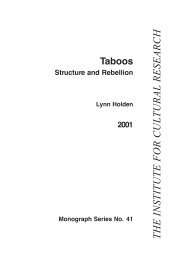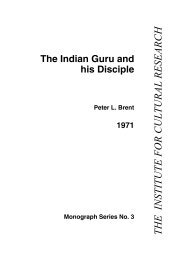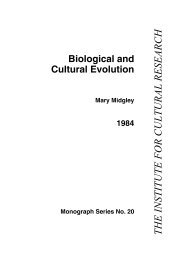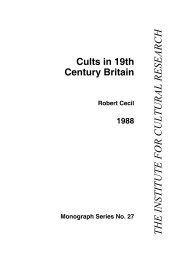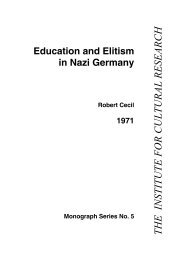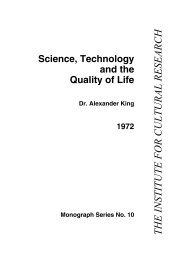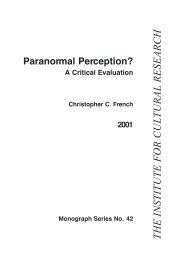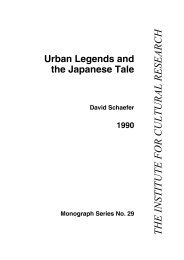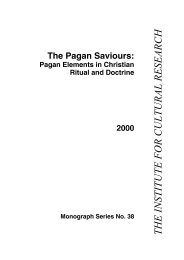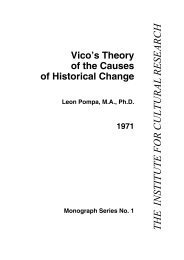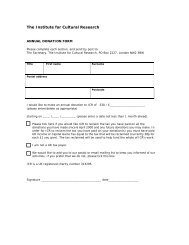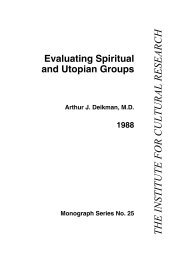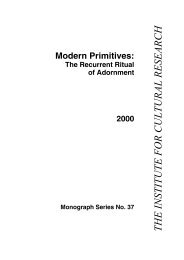Cultural Identity: Solution or Problem - The Institute For Cultural ...
Cultural Identity: Solution or Problem - The Institute For Cultural ...
Cultural Identity: Solution or Problem - The Institute For Cultural ...
Create successful ePaper yourself
Turn your PDF publications into a flip-book with our unique Google optimized e-Paper software.
you’ve got to allay people’s fears on numbers. (M. Thatcher, 1978, TV<br />
interview)<br />
It would not be in the interests of the ethnic min<strong>or</strong>ities themselves if<br />
there were a prospect of further mass inward movement. That prospect<br />
would increase social tensions ... firm immigration control is essential<br />
if we are to have good community relations. (D. Hurd, 1987)<br />
‘<strong>Cultural</strong> difference’ then becomes taken f<strong>or</strong> granted as a<br />
‘problem’; immigrants’children are ‘t<strong>or</strong>n between two cultures’. It is<br />
assumed that it is human nature to be ethnocentric and rooted<br />
immovably in one’s own culture, that each person is essentially<br />
linked to his <strong>or</strong> her own cultural identity, seen as a thing which cannot<br />
change and adapt. Essentialist ideas about cultural identity are being<br />
used here to legitimate nationalist exclusion, controls on ‘black’<br />
immigration, foot-dragging over multicultural education, and so on.<br />
A third example comes from the Ma<strong>or</strong>is in New Zealand. This case<br />
also shows how anthropologists’ recent anti-essentialist views of<br />
culture sometimes conflict with m<strong>or</strong>e essentialist views which may be<br />
held by ‘the natives’. In New Zealand, there is a Ma<strong>or</strong>i social<br />
movement which fights f<strong>or</strong> land and cultural rights. Allan Hanson, a<br />
US anthropologist, undertook a study looking at the way Ma<strong>or</strong>i<br />
activists (mainly well-educated intellectuals) talked about Ma<strong>or</strong>i<br />
culture and hist<strong>or</strong>y. 15 <strong>The</strong>y had a particular st<strong>or</strong>y about Ma<strong>or</strong>i hist<strong>or</strong>y<br />
and the old migrations and religious beliefs of Ma<strong>or</strong>is and Hanson<br />
discovered these st<strong>or</strong>ies were basically myths derived from the<br />
erroneous the<strong>or</strong>ies of nineteenth-century European hist<strong>or</strong>ians. His<br />
‘exposé’ hit the local press and sparked trouble. Ma<strong>or</strong>is resented his<br />
intrusion and questioned his right to study them; only Ma<strong>or</strong>is should <strong>or</strong><br />
even could study Ma<strong>or</strong>is, they said. This shows the exclusionary nature<br />
of this version of Ma<strong>or</strong>i identity: Ma<strong>or</strong>i culture was such an essential<br />
part of every Ma<strong>or</strong>i that a non-Ma<strong>or</strong>i would not be able to understand<br />
it. <strong>The</strong>re is, of course, a real ethical and political point here about rights<br />
to intellectual property and about the arrogance implicit in a discipline<br />
whose hist<strong>or</strong>y has been, in part, the study of ‘them’ (supposedly<br />
ign<strong>or</strong>ant natives) by ‘us’ (the expert, and of course, Western,<br />
anthropologists). But the expression of this point through such an<br />
essentialist way of thinking does not, I think, represent a good solution.<br />
In sum: these notions of cultural identity provide a solution to<br />
various problems: they can be a source of pride and community <strong>or</strong><br />
17



